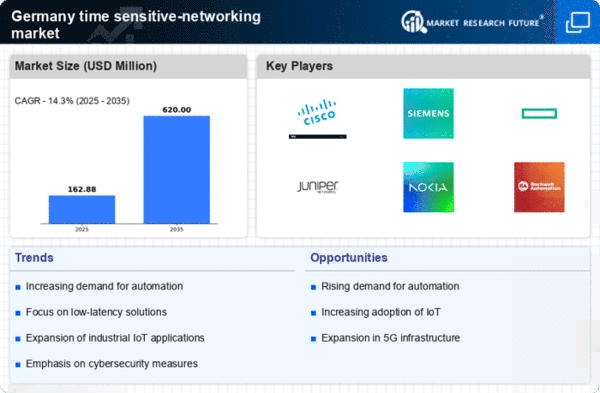Rising Adoption of IoT Devices
The proliferation of Internet of Things (IoT) devices in Germany significantly impacts the time sensitive-networking market. With an estimated 30 million IoT devices expected to be operational by 2026, the demand for efficient networking solutions becomes paramount. These devices require low-latency communication to function effectively, which aligns with the capabilities offered by time sensitive networking technologies. As industries such as healthcare, transportation, and smart cities increasingly integrate IoT solutions, the time sensitive-networking market is positioned to grow substantially. This trend suggests a shift towards more interconnected systems, where timely data exchange is critical for operational success.
Advancements in Network Infrastructure
In Germany, advancements in network infrastructure significantly influence the time sensitive-networking market. The deployment of high-speed fiber optic networks and 5G technology enhances connectivity and reduces latency, which is crucial for time-sensitive applications. Reports indicate that investments in network infrastructure are expected to reach €10 billion by 2026, reflecting the commitment to improving communication networks. These enhancements enable industries to implement more sophisticated time sensitive networking solutions, thereby fostering innovation and efficiency. As the demand for reliable and fast communication grows, These infrastructural developments are likely to benefit the time sensitive-networking market.
Increased Focus on Cybersecurity Measures
The time sensitive-networking market in Germany is increasingly shaped by the heightened focus on cybersecurity measures. As industries adopt more interconnected systems, the risk of cyber threats escalates, prompting organizations to invest in robust security protocols. It is estimated that cybersecurity spending in Germany will exceed €6 billion by 2025, indicating a strong commitment to safeguarding network integrity. This emphasis on security not only protects sensitive data but also ensures the reliability of time sensitive networking applications. Consequently, the time sensitive-networking market must adapt to these security demands, integrating advanced cybersecurity features into their solutions.
Growing Demand for Real-Time Data Processing
The time sensitive-networking market in Germany is experiencing a notable surge in demand for real-time data processing capabilities. Industries such as manufacturing and telecommunications increasingly rely on instantaneous data transmission to enhance operational efficiency. This trend is evidenced by a projected growth rate of approximately 15% annually in sectors utilizing time sensitive networking solutions. The ability to process data in real-time allows organizations to make informed decisions swiftly, thereby improving productivity and reducing downtime. As companies seek to optimize their processes, the time sensitive-networking market becomes integral to their strategies, facilitating seamless communication and data flow across various applications.
Regulatory Support for Technological Innovation
Regulatory frameworks in Germany play a pivotal role in shaping the time sensitive-networking market. The government actively promotes technological innovation through various initiatives and funding programs aimed at enhancing digital infrastructure. For instance, the Digital Strategy 2025 outlines plans to invest €12 billion in digital transformation, which includes support for time sensitive networking technologies. This regulatory support encourages companies to adopt advanced networking solutions, fostering a conducive environment for growth. As regulations evolve to accommodate emerging technologies, the time sensitive-networking market is likely to expand, driven by both public and private sector investments.
















